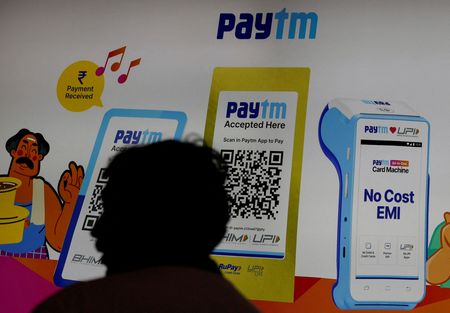(Reuters) -India’s Paytm on Tuesday reported a wider sequential loss for the March quarter as one-time employee stock option costs weighed on earnings.
The digital payments firm posted a loss of 5.4 billion rupees ($64.03 million) for the three months ended March 31, compared with a loss of 2.08 billion rupees in the previous quarter.
Founder and CEO Vijay Shekhar Sharma gave up 210 million in employee stock options (ESOP) during the quarter, triggering a one-time expense of 4.92 billion rupees.
The company expects ESOP costs to decline to up to 750 million rupees for April-June, compared to 1.69 billion rupees in the January-March quarter.
Sharma’s move came months after India’s market regulator determined that the grant of 21 million ESOPs to Sharma violated its rules governing share-based employee benefits.
One of India’s first fintech firms to go public, Paytm said its earnings before interest, taxes, depreciation, and amortization (EBITDA) before the cost of employee stock options, was 810 million rupees, compared to negative 410 million rupees in the previous quarter.
Analysts at Motilal Oswal expected the company to report EBITDA before ESOP breakeven in the quarter, while Emkay Global expected the company to post a positive number for the metric.
Paytm’s revenue from operations rose 4.6% sequentially to 19.12 billion rupees, as the company continued to recover from the winding down of its payments bank unit.
Revenue from financial services, which includes its loan business, rose 9% and payment services business climbed 4%.
The country’s financial regulator wound down Paytm’s banking unit in January 2024, citing persistent compliance issues, sparking worries about its digital payments business and leading to a near 60% drop in Paytm’s stock within two weeks.
Since then, however, it received regulatory approval to sign on new Unified Payments Interface (UPI) users, helping the stock recover.
($1 = 84.3370 Indian rupees)
(Reporting by Nishit Navin; Editing by Nivedita Bhattacharjee)










